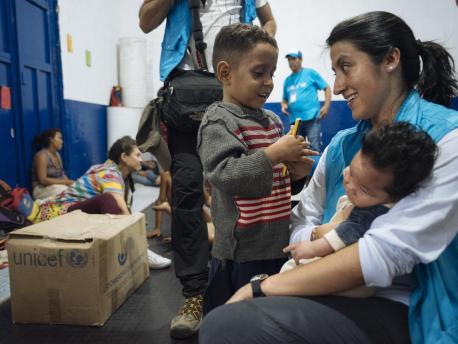
As More Venezuelan Families Flee to Colombia, UNICEF Is There To Help
With new groups arriving every day, UNICEF is amping up support for migrants, refugees and their host communities in Colombia.
UPDATE, MAY 1, 2019: "At least 15 children between the ages of 14 and 17 have been injured during street protests in Venezuela," said UNICEF Executive Director Henrietta Fore. "Potentially violent street protests in Venezuela are exposing children and young people to injury and harm. I urge all those involved to take immediate measures to protect children from any type of violence.
"UNICEF's humanitarian work in Venezuela seeks to meet the basic needs of children and families. UNICEF and partners are providing vaccines, antimalarial treatment, midwifery kits and vitamin and mineral supplements. To help children cope with the stress of violence, UNICEF has set up Child-Friendly Spaces in Caracas, Zulia and other locations across the country. In addition, UNICEF is providing safe drinking water and hygiene supplies, and educational and recreational materials for children.
"UNICEF echoes the United Nations Secretary-General's call for all sides to exercise maximum restraint. The children and young people in Venezuela should be able to enjoy their rights to health, education, protection and participation safely and at all times."
At least 327,000 children from Venezuela are living as migrants and refugees in Colombia. Without increased support, their health, education, protection and well-being will be in jeopardy.
At least 327,000 children from Venezuela are living as migrants and refugees in Colombia. They need humanitarian assistance.
The economic and political situation in Venezuela has caused an estimated 3.7 million Venezuelans to leave their homes for Brazil, Colombia, Ecuador, Peru and other countries in the region. Some 1.2 million Venezuelans are in Colombia, often living in vulnerable host communities with already overstretched resources.

On April 23, 20109 in Cucuta, Colombia, a group of migrants crosses an illegal path next to the bridge connecting Colombia and Venezuela. © UNICEF/UN0303650/Arcos
"At a time when anti-migrant sentiment is growing worldwide, Colombia has generously kept its doors open to its neighbors from Venezuela," said Paloma Escudero, UNICEF Director of Communications, who just returned from a four-day visit to Cucuta, on the Colombian side of the border with Venezuela. "As more families make the painful decision to leave their homes in Venezuela every day, it is time for the international community to step up its support and help meet their basic needs. We cannot let that generosity wear thin."

On April 23, 2019 in Cucuta, Colombia, UNICEF Director of Communications Paloma Escudero speaks with a woman and her child at the UNICEF-supported health center. © UNICEF/UN0303647/Arcos
UNICEF is working closely with other humanitarian agencies, national and local authorities, nongovernmental organizations and communities in Colombia to provide migrant children as well as children in host communities with health, nutrition, education and protection.
UNICEF is working closely with partners to provide support for migrants and refugees and children in host communities
To that end, UNICEF is supporting mobile health teams, setting up Child-Friendly Spaces where children can play and receive counseling, providing safe drinking water and sanitation services, promoting hygiene practices, setting up protective learning spaces, distributing school supplies, training teachers and offering nutritional support.

On April 25, 2019, volunteer Pureza Peña (far right) plays with children from Venezuela during a workshop at a Child-Friendly Space in Cucuta, Colombia, where UNICEF provides learning activities for Venezuelan migrant children and their parents. The program is supported by UNICEF in coordination with OIM and the Colombian Chancellery. © UNICEF/UN0304585/Arcos
More funding is needed to assist and protect Venezuelan families crossing into Colombia
Working in Colombia in 2019, UNICEF aims to:
- Help vaccinate more than 300,000 children
- Provide water, sanitation and hygiene services for 13,000 children
- Provide 40,000 children with formal and informal learning opportunities
- Reach 90,000 children and adolescents with actions to prevent and address violence, abuse and exploitation, including gender-based violence and the prevention of child recruitment
UNICEF needs $29 million to support the basic nutrition, health, education, water, sanitation and hygiene and protection needs of families crossing into Colombia. To date, UNICEF has only received $5.7 million.
Top photo: On April 24, 2019 in Cucuta, Colombia, UNICEF Communication for Development Specialist Andrea de la Torre visits with children who recently arrived from Venezuela with their families. © UNICEF/UN0304097/Arcos
HOW TO HELP
There are many ways to make a difference
War, famine, poverty, natural disasters — threats to the world's children keep coming. But UNICEF won't stop working to keep children healthy and safe.
UNICEF works in over 190 countries and territories — more places than any other children's organization. UNICEF has the world's largest humanitarian warehouse and, when disaster strikes, can get supplies almost anywhere within 72 hours. Constantly innovating, always advocating for a better world for children, UNICEF works to ensure that every child can grow up healthy, educated, protected and respected.
Would you like to help give all children the opportunity to reach their full potential? There are many ways to get involved.



